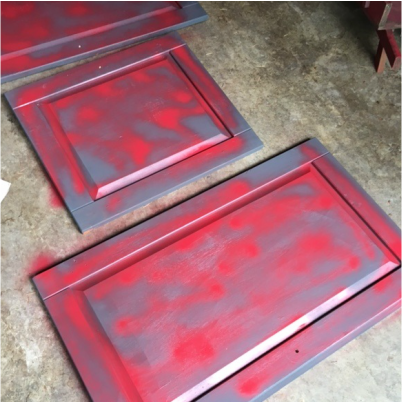|
Amy enjoys baking cakes. First, it's just for her children but when other moms' see her epic cakes at birthday parties and start placing orders for their kids' parties, she's really encouraged. Lots of enthusiastic people tell her, "you should do this for a living."
It would be nice to spend her days doing what she loves, Amy thinks. Time passes, cakes are baked, money changes hands and before long, Amy's Cakery is now registered with the local chamber of commerce. These delicious desserts beat the odds and Amy's Cakery thrives. But where is Amy? -Writing training manuals for her teenage staff -Searching for the highest quality Vanilla extract at the best price -Making her weekly supply run to Costco, buying as much flour and sugar as her Subaru can carry...and then stopping abruptly to deal with an overflowing toilet in the shop's main bathroom. She's doing everything BUT baking cakes. Misty's story is a little different. She wants to be a rock star. She sings, writes original music and loves nothing more than performing on a stage for an eager audience. She's passionate alright, but she's not willing to move to Los Angeles, New York or Nashville and grind for an undetermined amount of time for the chance to become the next Taylor Swift. So she gets her degree in mechanical engineering, accepts a sweet job making buckets of money in the city of her choice, starts a band--because that's her passion, and rocks out on weekend gigs singing mostly covers but a few of her originals too. Who's living the dream? Or maybe the better question is, why does so-called "passion" have to be decisive in career choice? I get the concept that if you "do what you love" you'll probably be really good at it and by consequence, successful--whatever that means. Yet it seems that whenever skills are monetized, some of the luster is lost. Now projects have deadlines, customers have expectations and sponsors have control. Of course I hope you'll have contentment on the job and satisfaction with your effort--but skillful, quality work doesn't necessarily go hand-in-hand with "passion." As Christians, we're supposed to do everything for the glory of God--even basic necessities like eating and drinking are to be done with Him in mind (1 Corinthians 10:31). We're also supposed to work heartily and enthusiastically--not because it's our favorite thing ever--but because we're ultimately working for the Lord, not merely our supervisor. (Colossians 3:23). What if you ask God what you're supposed to do with your life? Considering He gave you the gifts you have in the measure you have them, you can trust He's got a plan to use them well. This might look like attending the school you can afford, learning a trade that's introduced in your high school, availing yourself to trends in the market and pursuing a career that'll get you hired...so you can actually afford to be passionate on your day off. It also might look like working jobs you aren't crazy about but building a great reputation while you're there. Because if there's one thing we should be passionate about, it's knowing God. And He can meet you anywhere. Your interests and abilities should influence a career. God gave them to you to glorify Him and those giftings may lead you to fill a role that only you can--I'm just suggesting another way of defining success. And a j-o-b that pays the bills, maybe even provides health insurance and a retirement plan so you can spend your weekends baking cakes or jamming with your band sounds like a win to me. Finish well, Dionne
1 Comment
 Having a little fun with historical fiction. Do you know who is telling the story? Enjoy! The atmosphere was charged. Peculiar clouds gathered near the top of Mount Tabor, whispering eternal secrets later retrieved by the wind and whisked down rocky hills leaving a wake of jagged stones and upturned thorn bushes. The recondite gust nearly bowled over a cluster of rugged fisherman, spent and sweaty as they threw lines and hauled baskets along the seashore. The rumors were grand enough that many flocked to hear him or catch a glimpse. Sometimes I loitered publicly other times camouflaged in shadow, but like the commoners--I too sought answers. I'll never forget the ripple of fear that reverberated through me the previous afternoon, outside the temple, when the shrill voice of a poltergeist set loose from the bowels of Hell squealed and shrieked. It called him the Holy One of God. It asked if he--a lowly carpenter's son from Nazareth would destroy him? This--while its human host writhed and sputtered on the polished stone floor of the temple court. We watched in grotesque fascination as the demoniac bashed his head repeatedly, gouging himself--his face a bloody mask. His tongue, swollen and obscene--hung from his mouth like a mad dog's. It was disgusting and shameful and I wondered how this Jesus of Nazareth would manage such a display. It was hopeless. I readied myself to leave--when I heard him speak-- audibly yet it couldn't have been more than a whisper. The fear I felt when I heard the demon's call was nothing in comparison to the dread that washed over me now. "Be quiet, and come out of him!" he commanded. And it did. There was talk of a local beggar, riddled with leprosy, an outcast according to our law, who fell down before him, pleading: "If you are willing, you can make me clean." His lips trembled as he sat in the mire, head bowed; eyes downcast. The upright man was almost unremarkable in his appearance--plain features etched in olive skin with deep-set hazel eyes. But I said almost, didn't it? Those eyes would occasionally flash and sparkle like lightening during a rainstorm--his whole presence exuding inscrutable beauty; his words--absolute authority. The groveling leper never should have approached him. If he knew this man's strange power-- as I did, he would be too terrified to get close. A wave of compassion spread across the Nazarene's face--not embarrassment or annoyance as I predicted. Furthermore, he reached out to the man with his right hand. He grasped the beggar by the back of the head, cradling his face and tilting his wanton eyes up. He sought the man's attention, consideration--dare I add: devotion. They stood like that for some time, like one was a devoted father and the other a bereaved son. The leper looked up, slowly with dawning knowledge--his blistered face muddy and tear-stained. "I am willing, be cleansed" Jesus said. And he was. When I heard he was returning to Capernaum I ensured space at the house where he planned to speak. Scribes and other members of the council were there so it was permissible that I was in attendance. Though his message seemed to suggest unity--a palpable divide was slicing its way through the region. It was difficult to articulate but we all felt it--from the highest-level Pharisee to the common laborer--there was something polarizing about this man. Caution and discretion were essential. I intended to linger toward the back of the room--keeping one eye on this enigmatic miracle-worker and the other on the crowd whose devotion seemed to flourish by the day. However, the sheer number of people--easily more than a hundred, ushered me forward and I found myself separated from my colleagues, lost in a sea of onlookers. Jesus sat in a chair on a raised platform up front. A throng of women of all ages gathered on one side and a group of young children on the other. His students stood at various locations in the packed house--their faces grave as they saw the number of people and felt their desperation and curiosity. This situation could easily become dangerous--and that's when we heard pounding on the roof. The disciples jumped to alarm--two running to their leader--who seemed utterly unperturbed, the others looking for the source of the commotion. Just then dust began to fall from the ceiling, then clumps of clay and roof tiles--then a man. The young man, barely more than a boy, his body broken and mangled, lay deathly still on a bamboo pallet that had been lowered, quite roughly, from the rooftop. Three friends still up above cheered as they stared down at him. One jumped through the hole, apologized aloud to the homeowner and told the harrowing story of how their friend and his brother was paralyzed in a farming accident. The man wept for his young brother and laid a hand on him--the other wiping his eyes as he pleaded for help. "Son, your sins are forgiven," Jesus said to the crumpled heap before him. I gasped and without even looking, knew the other council members were fuming. There had been other messiah-types but none so bold as this. What does forgiveness have to do with paralysis? Only God can forgive sins. This so-called rabbi is nothing more than a shameless.... "Blasphemer." I didn't say it, I only thought it but I thought it to his face. A hundred pair of eyes focused on me but I actually felt his. They burned. Feet shuffled and pathway opened between us as the crowd parted. Despite the multitude, it was just him and me. "Which is easier to say?" he asked me, "Your sins are forgiven? Or...." His pause was deliberate. Did he want me to say it? My mouth was dry--my body frozen. "...Get up, pick up your pallet and walk?" His eyes teased the question. The whole room fell silent. Only a moment ago physical healing would have loomed as the greater of the two, the giver of such a gift clearly possessing power beyond our knowledge, but now I wasn't so sure. I was a Pharisee--a teacher of the law, yet stood tonged-tied before this Nazarene. Facing me, he spoke. "So you may know I have authority on earth to forgive sins," he turned his gaze to the injured youth on the floor, "I say to you, get up, pick up your pallet and go home." Immediately, the boy's body returned to its intended form, his countenance changing in the process. He looked at his benefactor--smiling, then broke into laughter. He stood up with ease and followed the commands he'd been given joyfully. The crowd rejoiced, I grew hungry for answers and the healer retreated. I sought him that night, desperately, like a child lost at the bazaar would seek his father. He told of Regnum Dei, the Kingdom of God, of being born a second time of water and Spirit. I didn't understand yet he was patient. He said God loved the world and offered up his son that whomever believed in him would live and not die. He was the son. And I believed. Later, I was mocked by council members who in a murderous scheme, plotted his demise. I will not describe the atrocities they committed against him. It was equally heartbreaking to watch the crowds who had been blessed by his teaching, to become vehement. They wanted blood. A death worthy of a treacherous criminal was his. I half expected his eyes to flash with power as he severed himself from that torturous Roman cross--saving himself as he had saved so many others. But he didn't. And then I recognized a familiar emotion bloom on his face despite unimaginable anguish. He bore the same expression when encountering the leper: compassion. I wondered then who his grief was truly for. He died soon after. Myself and another man received his body with hearts heavier than the bags of spices I hauled. We buried him according to our custom, bound tightly in linen strips soaked in aloe and myrrh. We carried him to a garden, blooming with tulips and lilies and laid him in Joseph's own tomb. I made a mirthless joke: Where would Joseph's body go upon death? But then I remembered Jesus' words, his promise, that whoever believes in him, the Holy One of God and the carpenter's son, proceeding from Heaven and Nazareth, wouldn't die, but live. I knew then the tomb couldn't hold him for long. My head swam with truths that seemed contradictory while hope sent my heart soaring. I held tightly to my burgeoning faith, pondering our encounter while pouring over the ancient texts. Returning to the very place where the demon had spoken his name, I spoke it too. Loudly for all to hear. The wind caught my words and carried them, sowing them near and far. It's the strangest thing--how you can be content with something for years and years and one day, wake up and decide it has to change. One Saturday morning over a holiday weekend, I woke up early, hit the gym and returned home with the energy of a Roman army. (A most unusual experience.) I packed up my kids, hit Home Depot and bought materials to build a shelf, make a chalkboard and paint my oak dining room table a smoky black. It was a daring and dramatic undertaking--considering my limited skillset, but I was inspired and sometimes that's enough. However, this story isn't about inspiration or my living room's epic transformation from hodgepodge to industrial vintage. It's about a plain old cabinet that was in the wrong place at the right time and was forever changed as a result. The cabinet wasn't on my laundry list of to-dos that fateful day, but after completely changing the room's vibe, the 10-year-old Southwest style cabinet that housed our printer, modem and other boring yet vital computer components, looked dated and out-of-place. I had upped the ante in the room and this cabinet just wasn't living up to its potential. I decided to paint it red. "No!" my son bellowed. "Please, not red!" His aversion to crimson was surprising, but since I didn't currently own red chalk paint--and was happy to avoid another trip to Home Depot, I obliged. I painted the cabinet black. Then spray painted it red.  After visiting a couple vintage stores and watching YouTube tutorials about how to properly "distress" furniture, I was drawn to pieces that revealed multiple slices of coated-on paint--layers upon layers of contrasting colors exposed by deliberate sanding. The main color might've been turquoise, but the piece evidenced yellow, black, red and wood grain with all the eye-catching and conversation-starting uniqueness I sought. I planned to do the same with my cabinet: black with red layers of weathered paint. I already had a can of barn-red spray paint--in fact, we used it on the cabinet's hinges, so why not? You're probably assuming I totally botched the process. Especially after noting my handiwork in the photo above. But that's not where I'm going. The cabinet--though not nearly as red and distressed as I hoped, emerged as a smoky charcoal, grainy conversation piece with scuffed red hinges and subtle red hues that peak through. It is industrial vintage reclaimed awesomeness at its best. A boring cabinet mass produced and sold by a major retailer transformed into a one-of-a-kind piece of art custom-finished to match the room in which it sat. And I did it by completely destroying the finish--not once but three times. After the piece was unrecognizable I took to it with a heavy hand and grainy sandpaper, scarring the edges of the door frames and side panels. I scuffed the newly painted crimson hinges so they wouldn't look so newly painted. After all that abuse, I turned my sander on its side and made deep gouges in the top door panels. The end result was beautiful though the process, wasn't. You see where I'm going now, right? There is a master carpenter who--unlike me, knows precisely what his end result will look like. He's fashioning his beloved to image the glory of Himself--specifically seen and perfectly modeled in His son, Jesus Christ. By the power of the Holy Spirit and the tools of adversity, loss, suffering and anything else He so chooses--because all things exist for His glory, He takes the life of an ordinary person who called by that same spirit stakes their hope on Him--and begins the work of a lifetime . Removing, refinishing, replacing, restoring, rebuilding. He sands away rough edges--or distresses the façade with the precise hand of master builder who knows the degree of renovation needed by a soul to image His love. He may leave the surface unscathed or allow deep gouges to penetrate the veneer, forever scarring what we thought was good enough. His vision is far above ours, His purposes are vast, yet from the perspective of those of us wading through the mire of tribulation it often seems incredulous, villainous. Trust isn't cheap and faith in a God you can't see isn't easy. The process of becoming beautiful can seem cruel and arduous and it might be--but the finish and all the relief and joy it brings, well that will so far exceed our suffering--it won't even be worthy of comparison. We know that's true (and oh what a truth!) because we believe the Bible. The Apostle Paul, in his masterwork, Romans, put it like this, "For I consider that the sufferings of this present time are not worth comparing with the glory that is to be revealed to us." Personally, I've endured several minor heartbreaks and about three really significant ones that lead me to question the veracity of Paul's words and the goodness of God's intentions. I've had loved ones endure even worse. Sometimes there's an answer that brings peace, but many times the reasons are elusive. To us. Right now. I don't know why God allows the pain he does into the lives of his people. But I also don't know that He should bear the brunt of our blame. All of creation, which includes us, according to Romans, has been subjected to meaninglessness, because of our rebellion against the source of Meaning. The imprint of God's image--though greatly marred, still sparkles within and so we desire that which now seems elusive: enduring love, significance and everlasting joy. C.S.Lewis says it best in Mere Christianity, "If I find in myself a desire which no experience in this world can satisfy, the most probable explanation is that I was made for another world." Indeed, we are made for another world where all our righteous desires will be sated and fellowship with our Creator will be fully and finally restored. And Time, that relative restraint that ushers in our days and nights--will give way to eternity. In that way also, our 80 or 90 years of turmoil here won't be worth comparing to everlasting joy, there. Becoming beautiful, namely imaging the glory of Jesus Christ the way we ought, begins here, on this side of the finish line. It takes a lifetime of Spirit-lead renovation to bring us to a place where we're finally ready to stand before him and experience the elation of our faith made real. Tangible. Conclusive. Be hopeful and patient because the finish line is approaching--and it will be here before you know it. Finish well, Dionne For the creation waits with eager longing for the revealing of the sons of God. For the creation was subjected to futility, not willingly, but because of him who subjected it, in hope that the creation itself will be set free from its bondage to corruption and obtain the freedom of the glory of the children of God. For we know that the whole creation has been groaning together in the pains of childbirth until now. And not only the creation, but we ourselves, who have the firstfruits of the Spirit, groan inwardly as we wait eagerly for adoption as sons, the redemption of our bodies. For in this hope we were saved. Now hope that is seen is not hope. For who hopes for what he sees? But if we hope for what we do not see, we wait for it with patience. Romans 8:19-25 |
Dionne"Lay aside every weight and the sin that so easily entangles and run with endurance the race set before you. " Archives
June 2023
Categories |


 RSS Feed
RSS Feed